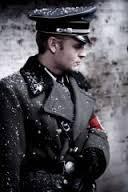What do you think?
Rate this book


430 pages, Paperback
First published March 25, 2014



It’s almost the centrepiece of western culture’s narrative of the twentieth century and every nation that was involved in the Second World War sort of feels a degree of ownership over it. There’s a very strong history of portrayals of the Holocaust that strip it down to Good Gentiles versus Bad Gentiles, and which treat Jewish people as sort of tokens by which everyone else can prove their virtue or villainy. This is really deeply embedded in western culture. And can, I think, genuinely be seen as a subtle and pernicious form of anti-Semitism.
